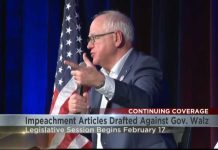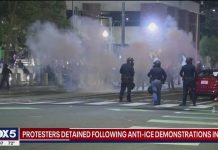
Portland’s police union is breaking ranks with the city’s progressive leadership, signaling readiness to partner with President Trump’s administration on law enforcement—a stunning move that exposes deep fractures over how to confront rising crime and civil disorder.
Story Snapshot
- Portland Police Association willing to collaborate with federal authorities despite fierce opposition from Mayor Keith Wilson and Governor Tina Kotek
- Federal courts blocked Trump’s National Guard deployment in early October, with Ninth Circuit appeals ongoing as of October 8
- Union’s stance highlights rift between rank-and-file officers seeking resources and reform-minded politicians resisting federal intervention
- Constitutional battle tests limits of presidential power versus state sovereignty under the Tenth Amendment
Police Union Defies Local Leadership
The Portland Police Association has signaled openness to working with President Trump’s administration on public safety strategies, directly contradicting the unified opposition from Portland’s mayor and Oregon’s governor. This unprecedented split reveals a fundamental disagreement over how to address what union representatives describe as deteriorating conditions on the ground. While Mayor Wilson calls federal deployment “unwanted, unneeded, and un-American,” the union representing rank-and-file officers sees potential benefits in federal support for bolstering officer safety and public order. This divide exposes the tension between political leaders prioritizing local autonomy and frontline officers seeking reinforcements amid what they perceive as inadequate city backing.
The police union’s position marks a dramatic departure from Portland’s political establishment. Governor Kotek filed lawsuits asserting state sovereignty under the Tenth Amendment, while Mayor Wilson has publicly denounced any federal military presence. The union’s willingness to collaborate suggests officers feel caught between political leadership resistant to tough enforcement measures and communities demanding action on crime. This stance aligns with the union’s historical resistance to progressive reform efforts and advocacy for stronger policing methods, putting it at odds with city council priorities focused on community trust and de-escalation approaches.
Federal Deployment Blocked by Courts
President Trump’s attempt to deploy California National Guard troops to Portland hit immediate legal roadblocks when U.S. District Judge Karin Immergut issued a restraining order on October 5, citing constitutional concerns about federal overreach. The Trump administration announced plans in late September to federalize and deploy National Guard units from multiple states, framing Portland as a city in crisis requiring federal intervention. Judge Immergut’s ruling emphasized the Tenth Amendment’s protections of state sovereignty and the dangerous precedent of military intrusion into domestic civil affairs. The Ninth Circuit Court of Appeals heard arguments on October 8 regarding the legality of troop deployment, with judges questioning both the factual basis for claims of insurrection and the constitutional authority being invoked.
The legal battle centers on whether Portland faces genuine lawlessness justifying federal military action or whether the Trump administration is exploiting isolated incidents to expand presidential power. Governor Kotek’s lawsuit asserts that the situation does not meet the threshold for invoking the Insurrection Act, with city officials emphasizing that local police have made necessary arrests without requiring military-style intervention. California Governor Gavin Newsom and Illinois Governor J.B. Pritzker have joined the opposition, calling the deployment an abuse of power and warning against normalizing federal military presence in state affairs. This represents a fundamental test of federalism—whether states retain the right to manage their own law enforcement without presidential override.
Constitutional Clash Over Federal Authority
The Portland situation resurrects longstanding debates about the proper balance between federal power and states’ rights in domestic policing. Constitutional scholars point to the Tenth Amendment’s reservation of powers to states and the historical American tradition of resisting military involvement in civilian law enforcement. The Trump administration’s invocation of a national crisis to justify deployment echoes 2020’s federal intervention during racial justice protests, when federal agents faced similar legal and political resistance. Civil liberties advocates warn that normalizing military-style federal policing erodes local control, democratic accountability, and constitutional protections against government overreach—concerns that resonate with traditional conservative principles of limited federal government and state sovereignty.
The courts’ role in arbitrating this dispute will set crucial precedents for future administrations. If the Ninth Circuit upholds the restraining order, it will reaffirm constitutional limits on presidential power to deploy military forces domestically without clear legal justification. If the court sides with the Trump administration, it could establish broader executive authority to intervene in cities deemed insufficiently responsive to federal law enforcement priorities. The absence of detailed crime statistics supporting claims of a “surge” leaves the factual foundation for intervention contested, with local officials insisting the situation remains manageable under existing municipal resources and authority.
Sources:
Federal judge blocks Trump’s deployment of National Guard troops to Portland
Trump Is Abusing His Power to Build a Dangerous National Policing Force
Portland’s Response to Federal Troops
Full Transcript: Ninth Circuit Court Hearing on Trump Troop Deployment
















